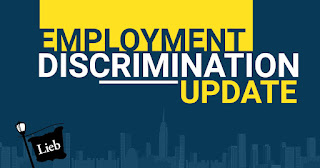On October 29, 2020, the NYC City Council approved a new law that requires the Department of Social Services to provide a letter to applicants about their rights to be free from source of income discrimination.
This is yet another reminder that landlords and brokers need to understand that source of income discrimination is illegal and can subject them to large fines / judgments, loss of licensing, and terrible public relations issues.
Landlords and brokers should review the NYC Commission on Human Right's Best Practices for Licensed Salespersons and Brokers to Avoid Source of Income Discrimination and revise their applications, leases, policy manuals, and trainings to reflect this new expected law.
For help, contact Lieb Compliance.
The new law adds new §21-141.1 to the Administrative Code as follows:
Information regarding lawful source of income discrimination. a. Definitions. For purposes of this section, the following terms have the following meanings: CityFHEPS. The term “CityFHEPS” means the city fighting homelessness and eviction prevention supplement program established pursuant to chapter 10 of title 68 of the rules of the city of New York or any successor program. Covered entity. The term “covered entity” means the owner, lessor, lessee, sublessee, assignee, or managing agent of, or other person having the right to sell, rent or lease or approve the sale, rental or lease of a housing accommodation, constructed or to be constructed, or an interest therein, or any agent or employee thereof, who is subject to the prohibition on discrimination based on lawful source of discrimination pursuant to subdivision 5 of section 8-107. Lawful source of income. The term “lawful source of income” has the meaning as set forth in section 8-102. Shopping letter. The term “shopping letter” means a letter issued by the department to assist a household in its housing search that identifies the household as potentially eligible for CityFHEPS and lists the maximum rent. b. The department shall provide written notice regarding the protections of section 8-107 related to lawful source of income at the time that a CityFHEPS applicant receives a shopping letter. Such notice shall be developed by the New York city commission on human rights pursuant to paragraph p of subdivision 5 of section 8-107 in consultation with the department.
It also amends §8-107(5) by adding new paragraph (p) as follows:
For purposes of this paragraph, the term “CityFHEPS” means the city fighting homelessness and eviction prevention supplement program established pursuant to chapter 10 of title 68 of the rules of the city of New York or any successor program. The commission shall develop and disseminate a written notice of protections of this subdivision related to lawful source of income. The notice shall be made available to the department of social services for use in accordance with section 21-141.1. The notice shall include, at a minimum, the following information:
1. Examples of different forms of lawful source of income;
2. A description of covered entities required not to discriminate on the basis of lawful sources of income;
3. Examples of actions that may indicate discrimination based on lawful source of income in violation of title 8, such as refusing to accept lawful source of income for rent payment, publishing any type of advertisement that indicates a refusal to accept any lawful source of income, and refusing or delaying repairs because a person uses any lawful source of income for rent payment, publishing any type of advertisement that indicates a refusal to accept any lawful source of income, and any additional actions landlords or brokers use to unlawfully discriminate against a person on the basis of their using any lawful source of income;
4. A statement that it is illegal for covered entities to refuse to accept a CityFHEPS subsidy for payment of rent or a security deposit voucher in buildings subject to the prohibition on discrimination on the basis of lawful source of income pursuant to section 8-107;
5. A statement that it is illegal for covered entities to request additional payments for rent, a security deposit or broker’s fee because an individual receives rental assistance;
6. A statement that it is illegal for covered entities to publish any type of advertisement that indicates a refusal to accept rental assistance;
7. A statement that it is illegal for landlords to refuse or delay making repairs to an individual’s unit because such individual pays rent with a CityFHEPS subsidy;
8. A statement that an individual has the right to be free from discriminatory, harassing or threatening behavior or comments based on such individual’s receipt of or application for CityFHEPS;
9. Directions on how to contact the commission, the department of social services’ source of income discrimination unit, the state division of human rights and the office of the state attorney general;
10. A description of potential remedies available at the commission if a covered entity is found to have engaged in discrimination based on lawful source of income; and
11. Any other information deemed appropriate by the commissioner and the commission in consultation with the department of social services.
Upon the Mayor's signature, the law will take effect 180 days thereafter.












